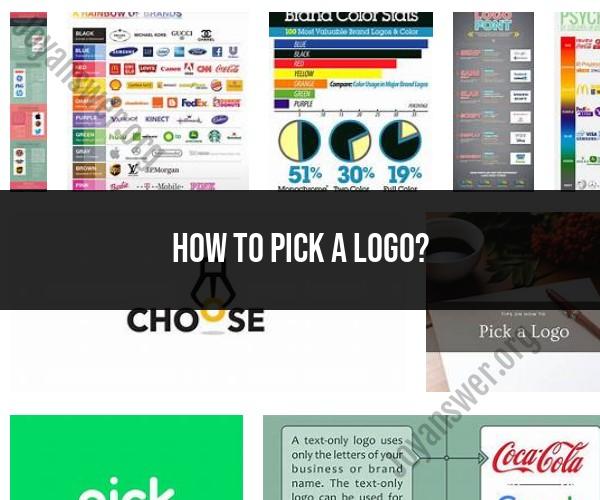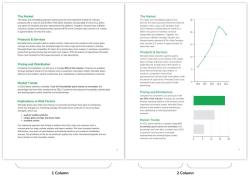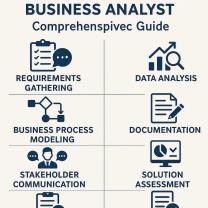How to pick a logo?
Choosing the perfect logo for your brand is a critical step in establishing a strong visual identity. Your logo will represent your brand in various contexts, so it's essential to get it right. Here's a step-by-step guide to help you pick the perfect logo:
Understand Your Brand Identity:
- Before diving into the design process, have a clear understanding of your brand's identity, values, and mission. Your logo should reflect these aspects.
Define Your Target Audience:
- Consider who your target audience is and what appeals to them. Your logo should resonate with your audience's preferences and expectations.
Research Your Competitors:
- Analyze the logos of your competitors. Identify common elements and themes in your industry to ensure your logo stands out while still fitting within your niche.
Set Clear Goals:
- Define the objectives you want to achieve with your logo. It might be to establish trust, convey a specific message, or make your brand more memorable.
Choose a Logo Type:
- There are various types of logos, including wordmarks, lettermarks, pictorial marks, abstract marks, and combination marks. Select the type that aligns with your brand's personality and goals.
Consider Color Psychology:
- Colors evoke emotions and associations. Choose colors that match your brand's personality and resonate with your audience. Be mindful of cultural interpretations of colors as well.
Typography Matters:
- If your logo includes text, carefully select the font. Ensure it's legible and aligns with your brand's style.
Simplicity is Key:
- Keep your logo simple and memorable. Avoid clutter and intricate details that may not scale well or become confusing when resized.
Sketch Ideas:
- Start with rough sketches or concepts. Experiment with different shapes, symbols, and layouts. Don't worry about perfection at this stage; it's about generating ideas.
Digitalize Your Ideas:
- Once you have a few promising sketches, digitalize them using design software like Adobe Illustrator or hire a professional designer if needed.
Seek Professional Help (Optional):
- If you lack design skills or want a truly unique and high-quality logo, consider hiring a professional graphic designer or a design agency.
Test and Gather Feedback:
- Share your logo drafts with trusted colleagues, friends, or potential customers to gather feedback. Consider their input and make necessary adjustments.
Iterate and Refine:
- Don't be afraid to revise your logo based on feedback. Iterate and refine your design until it meets your objectives and resonates with your audience.
Consider Scalability:
- Ensure your logo looks good and remains recognizable when scaled up or down, as it will appear on various platforms and materials.
Legal Considerations:
- Check for trademark availability to avoid legal issues in the future. You want to ensure your logo is unique and can be protected.
Finalize Your Logo:
- Once you are satisfied with your logo design and have addressed all feedback and legal concerns, finalize it for use in various marketing materials.
Maintain Consistency:
- Use your logo consistently across all brand materials, including your website, business cards, social media profiles, and merchandise.
Monitor and Evolve:
- As your brand grows and evolves, consider periodic evaluations of your logo to ensure it continues to represent your brand effectively.
Remember that your logo is just one part of your brand identity. It should complement your brand's overall messaging and values. With careful consideration and a focus on your brand's identity and goals, you can choose the perfect logo that leaves a lasting impression on your audience.
Designing a Logo: How to Choose the Perfect Symbol for Your Brand
Your logo is often the first thing potential customers will see, so it's important to make a good impression. A well-designed logo can help you communicate your brand identity and values, and make you stand out from the competition.
Here are some tips for choosing the perfect symbol for your brand:
- Keep it simple. A simple, memorable logo is more likely to stick in people's minds. Avoid using too many colors or complex designs.
- Make it relevant. Your logo should be relevant to your industry and your brand's values. For example, if you own a tech company, you might want to choose a logo that incorporates technology imagery.
- Be unique. You want your logo to be unique and stand out from other logos in your industry. Avoid using generic symbols or clip art.
- Think about the future. Your logo should be timeless and versatile. It should work well in a variety of contexts, such as on your website, business cards, and social media pages.
Here are some examples of successful logos:
- Apple: The Apple logo is simple, unique, and memorable. It's also relevant to Apple's brand identity, which is focused on innovation and creativity.
- Nike: The Nike swoosh is a simple but powerful symbol of movement and speed. It's also highly recognizable and versatile.
- Coca-Cola: The Coca-Cola logo is classic and timeless. It's also easily recognizable and versatile.
Logo Selection Made Simple: Tips for Picking the Right Symbol
Once you've considered the above factors, you can start brainstorming logo ideas. Here are some tips to help you get started:
- Think about your brand values. What do you want your logo to communicate about your brand? Are you reliable, innovative, or fun? Once you have a good understanding of your brand values, you can start to brainstorm symbols that represent those values.
- Research your industry. Take a look at the logos of other companies in your industry. What are they doing well? What could they be doing better? This research can help you to create a logo that is both unique and relevant to your industry.
- Sketch out your ideas. Once you have a few ideas for symbols, start sketching them out. Don't worry about making them perfect at this stage. Just get your ideas down on paper.
- Get feedback from others. Once you have a few sketches that you like, show them to friends, family, and colleagues for feedback. Their input can help you to refine your ideas and choose the best symbol for your brand.
Crafting a Visual Identity: The Art of Logo Selection
Choosing the right symbol for your logo is an important step in crafting your visual identity. Your visual identity is the overall look and feel of your brand, and it includes your logo, typography, and color palette.
When choosing a logo symbol, it's important to consider how it will look in different contexts. For example, will it look good on your website? On your business cards? On social media? It's also important to consider how your logo will look in different sizes.
Once you've chosen a logo symbol, you can start to develop the rest of your visual identity. This includes choosing a typeface and color palette that complement your logo.
Your visual identity should be consistent across all of your marketing materials. This will help to create a strong and cohesive brand image.
Choosing the right symbol for your logo is an important step in building a successful brand. By following the tips above, you can choose a symbol that is both unique and relevant to your brand identity and values.












